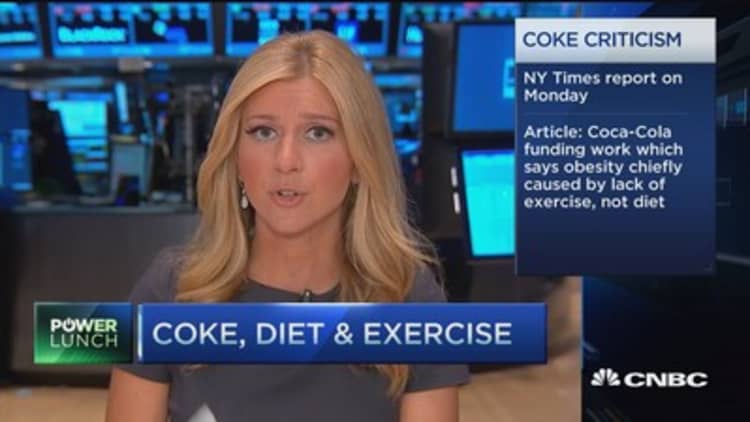
Following reports that Coca-Cola is backing a network that urges people to exercise more and worry less about slashing calories, one of the group's scientists is firing back.
James Hill is the president of the Global Energy Balance Network, a group funded in part by an unrestricted gift from Coca-Cola, which donated $1 million to the University of Colorado Foundation where Hill works and another half a million to the University of South Carolina, another member of the network.
The New York Times reported on the research on Sunday. Other media organizations subsequently had similar reports.
In a statement to CNBC, Hill said anyone suggesting that he and his colleagues promote the idea that exercise is more important than diet in tacking obesity "vastly oversimplifies this complex issue."
"[I] can say unequivocally that diet is a critical component of weight control, as are exercise, stress management, sleep, and environmental and other factors. The problem does not have a single cause and cannot be addressed by singling out only one of those factors in the solution," Hill wrote.
On its website though, GEBN says "there is strong evidence" it is easier to sustain an energy balance "by maintaining an active lifestyle and eating more calories" than "maintaining a sedentary lifestyle and eating fewer calories," since over the long term, attempts to restrict calorie intake are "likely to be ineffective."
Read More Diet Pepsi ditches aspartame, will customers return?
When asked for comment for this article, Coke pointed to a recent post from the company's chief technical officer, Ed Hays.
Regarding the Times article, he wrote, "The story claimed Coke is funding scientific research to convince people that diets don't matter—only exercise. In fact, that is the complete opposite of our approach to business and well-being and nothing could be further from the truth."
In an email, a NYT spokesperson wrote, "We stand by our story 100%."
Addressing the role of Coke at the group, Hill stressed its autonomy.
"The GEBN's research and educational efforts are independent and not subject to pre-approval by the Coca-Cola Company. Industry collaboration with higher education is a common practice today, and the University of Colorado has policies and procedures in place that adhere to high standards of professional and ethical conduct," he wrote.
The controversy comes as Coca-Cola faces declining sales of carbonated soft drinks. Coke's total carbonated soft drink volume dropped 1.1 percent last year while that of Pepsi fell 1.4 percent, according to a report earlier this year from industry publication Beverage Digest.
Coke has acknowledged "obesity concerns may reduce demand for some" of its items, citing it as a risk factor in its latest annual report.
In the same report, Coke wrote obesity "results from poor diets that are too high in calories combined with inactive lifestyles" and is a "complex public health challenge."
Coke rarely discusses the obesity epidemic in calls with Wall Street.
Read More
In the last two years, the company has mentioned the word "obesity" just three times, according to a CNBC analysis of conferences, earnings and guidance call transcripts from FactSet.
This is not unusual among beverage giants. Rival Pepsi didn't mention the epidemic by name once during the period but did discuss a potential sugar tax and a program that emphasizes the importance of balancing calories.
—CNBC's Sara Eisen contributed to this report.


